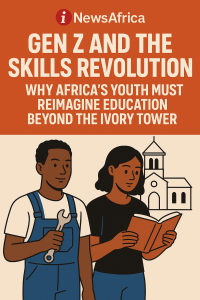Gen Z and the Skills Revolution: Why Africa’s Youth Must Reimagine Education Beyond the Ivory Tower

By Dr. Michael Omoruyi, iNewsAfrica
In the Western world, Generation Z is quietly rewriting the script on what success looks like. Instead of chasing four-year university degrees with crushing debt attached, more young people are opting for trade schools and technical training. The logic is simple: learn faster, spend less, and step directly into high-demand careers in fields like construction, electrical work, mechanics, IT, and healthcare. It’s a pragmatic revolt against the “degree or bust” narrative.
But what about their African counterparts?
Across the continent, Africa’s youth—the youngest population on earth—are navigating a different reality. While university education still carries unmatched prestige, Technical and Vocational Education and Training (TVET) is increasingly viewed as a lifeline to skills, self-reliance, and employability. The problem? The shift is uneven, underfunded, and burdened by stigma.

Infographic
Kenya: A Rising Tide
In Kenya, the tide is visibly turning. TVET enrolment has surged by more than 22% in a single year, even as university numbers dipped. Government investment, loans for trainees, and rebranding efforts have made vocational training more attractive. Yet, the old bias persists—many still see TVET as “second best” for those who couldn’t hack university life. If Kenya succeeds in changing this perception, it could become a model for the region.
Nigeria: Interest Outpaces Opportunity
Nigeria, Africa’s most populous nation, reveals a paradox. Surveys show that youth see TVET as a path to entrepreneurship and independence, yet only around 6–15% of Nigerian youth complete TVET programs. The barriers are stark: limited access, inadequate facilities, and an entrenched cultural mindset that equates success with a university degree. Unless Nigeria tackles the stigma and scales up investment, millions of young people will remain trapped between aspiration and unemployment.
South Africa: High Demand, Low Supply
South Africa’s story is both inspiring and alarming. Demand for TVET is sky-high, with 2.9 million applicants for only 589,000 college slots in 2021. But instead of expanding, enrolment has actually declined due to funding cuts and institutional bottlenecks. With nearly half of young South Africans not in employment, education, or training (NEET), this disconnect threatens social stability. Here, TVET isn’t just an option—it’s a necessity.
The Big Picture: Why Africa Can’t Afford to Wait
Across the continent, fewer than 15% of secondary school students pursue vocational education, compared to over 30% in North Africa. For Africa’s Gen Z, the prestige of university often outweighs the practicality of technical training. But with unemployment soaring, economies struggling to industrialize, and skilled trades in short supply, this mindset is unsustainable.
What Africa’s youth need is not just classrooms, but workshops, labs, apprenticeships, and partnerships with industry. Governments must invest not only in facilities but also in dignity—changing the narrative so that a welder or coder commands as much respect as a lawyer or banker.
A Call to Action
If the West’s Gen Z is leading a quiet revolution, Africa’s Gen Z must ignite a louder one. The continent’s future doesn’t hinge on how many degrees it awards, but on how many skills it cultivates. Technical training is no longer a fallback—it is the frontline of Africa’s economic survival and transformation.
The question isn’t whether Africa’s youth are ready for this shift. They already are. The real question is: are African leaders, policymakers, and societies prepared to give them the tools—and the respect—they deserve?
About the Author
Dr. Michael O. Omoruyi is a technologist, educator, and author of From Grit to Grace. He is the founder of iNewsAfrica, championing African and diaspora voices on technology, culture, and youth empowerment.

Dr. Omoruyi’s memoir launches across Amazon and other bookstores Worldwide October 21, 2025
Leave a reply Cancel reply
Popular Categories
- Colombia 1
- Nepal 1
- Culture 1
- Trade 1
- Ivory Coast 1
- ICJ 1
- Somali 1
- Europe 1
- United Nations 1
- Israel 1
- Travel 1
- Thailand 1
- Brazil 1
- Finland 1
- West Africa 1
- Automobile 1
- Mauritania 1
- Entertainment 1
- Mozambique 1
- Morocco 1
- Zimbabwe 1
- Myanmar 1
- Space 1
- The Hague 1
- Tunisia 1
- Vatican City 1
- Book & Arts Spotlight 1
- UNDP 1
- ECCAS 1
- Vietnam 1
- senegal 1
- Terrorism 1
- Global Diplomacy 1
- Wildlife 1
- Weather 1
- Celebration 1
- Interview 1
- BRICS 1
- Gambia 1
- Defense 1
- Gabon 1
- Pakistan 1
- Togo 1
- Democracy 2
- World Bank 2
- Algeria 2
- Rome 2
- Energy 2
- New York City 2
- Science 2
- Zambia 2
- Church 2
- Angola 2
- Economy 2
- Somalia 2
- Guinea 2
- Middle East 2
- Cameroon 2
- London 2
- Education 2
- Sierra Leone 2
- Business 2
- Chad 2
- Ukraine 2
- Caribbean 2
- Ukraine 2
- Haiti 2
- Russia 3
- South Sudan 3
- Uganda 3
- Crime 3
- Namibia 3
- India 3
- Ethiopia 3
- Music 3
- Transportation 3
- Rwanda 3
- Benin Republic 3
- Guinea-Bissau 3
- Lesotho 3
- France 3
- Aviation 3
- Congo 3
- Liberia 4
- Tanzania 4
- Health 4
- Egypt 5
- ECOWAS 5
- Libya 5
- UN 5
- UK 6
- Mali 7
- China 7
- Niger 8
- Editorial 8
- Sudan 9
- Burkina Faso 10
- Politics 11
- Tech 12
- Technology and Business 13
- Ghana 13
- World 15
- DR Congo 15
- Kenya 17
- Sports 17
- Opinion 18
- People 23
- South Africa 29
- US 47
- OP-ED 64
- Africa 87
- Nigeria 160

Email: [email protected]










